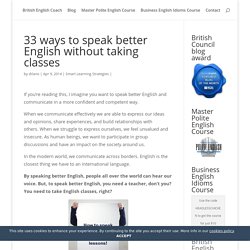

TC - Turkish Language Lessons. Learn English With Songs - Online Lessons and Exercises. 33 ways to speak better English. If you’re reading this, I imagine you want to speak better English and communicate in a more confident and competent way.

When we communicate effectively we are able to express our ideas and opinions, share experiences, and build relationships with others. When we struggle to express ourselves, we feel unvalued and insecure. As human beings, we want to participate in group discussions and have an impact on the society around us. In the modern world, we communicate across borders.
English is the closest thing we have to an international language. By speaking better English, people all over the world can hear our voice. Well, English teachers and English classes definitely help. What you need is to become a self-directed learner, somebody who takes responsibility for their own learning and creates their own learning programme to develop their English. Now, it’s certainly true that speaking is a social activity and is best done with other people. You can do the same with your English. 1. 2. What would be another way to phrase "the moral of the story is..."? Being a native English speaker is globally useless if you can’t speak other versions of English. Language skills are often trumpeted as a cornerstone of social integration, allowing citizens to participate fully in their host communities.

British prime minister David Cameron recently announced a £20m fund for English language lessons to tackle radicalisation in the UK, for example. Similarly, US presidential hopeful Donald Trump has called for assimilation and English-speaking in the US. But with transnational mobility and trade a defining feature of our times, what of Cameron’s or Trump’s own supporters and their ability to speak English within a wider international community?
Native English speakers are infamously unable to speak languages other than their own. As well as being a professional handicap, this has been shown to hinder exporters and hurt trade. And now ironically, there is mounting evidence that in international business, native English speakers are failing to integrate as a result of their shortcomings when it comes to tailoring their English for this context. How to use newspaper articles in language class. How should teachers use 'authentic' texts in class?

Author, trainer and teacher Rachael Roberts gives valuable advice on the example of newspapers. She will also be delivering a live-streamed presentation Opens in a new tab or window. from Belfast on writing effective classroom materials, 11 March 2014. Back in 1981, Vivian Cook Opens in a new tab or window. wrote: ‘One of the words that has been creeping into English teaching in the past few years is 'authentic'. It has a kind of magic ring to it: who after all would want to be inauthentic?’ Teachers and students are naturally attracted to authentic texts (by which I mean any text which has not been produced for the purpose of language learning).
But, as Cook goes on to say, we also need to consider just how helpful the authentic text we choose actually is for our students. First challenge: Text organisation For example, how clearly is the text organised? Second challenge: Headlines Newspaper headlines can also be hard to decipher. BBC Languages – Free online lessons to learn and study with.
How to help learners of English understand prepositions. Why are words like 'on', 'at', 'for' and 'about' so tricky for learners of English and how can teachers help?

Adam Simpson, winner of the British Council’s Teaching English blog award for his infographic on prepositions, explains. Prepositions and their importance in English Prepositions are tricky little beasts. The relative shortness of the words (most are six letters or under) and their often misplaced role in the overall scheme of things (why should prepositions be less important than nouns, adjectives or verbs?) Mean that we should treat them carefully and perhaps give them more time in the classroom than is usually the case. What exactly are prepositions and how are they used in English? In a list of English prepositions you will find very common words such as 'in', 'up', 'behind', 'from', and 'with'. What problems can prepositions cause for learners of English and their teachers?
First, most prepositions, especially the common ones, have several different functions.